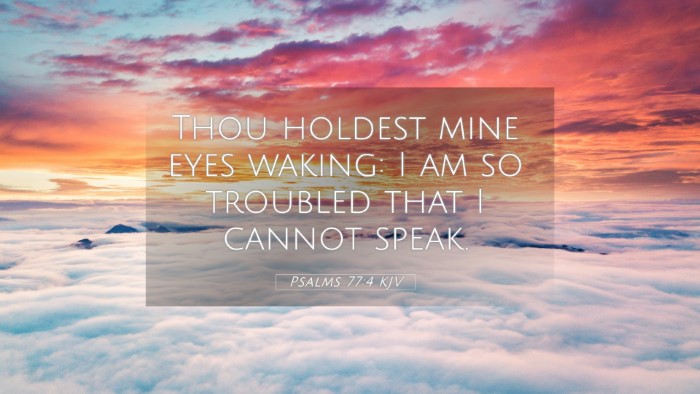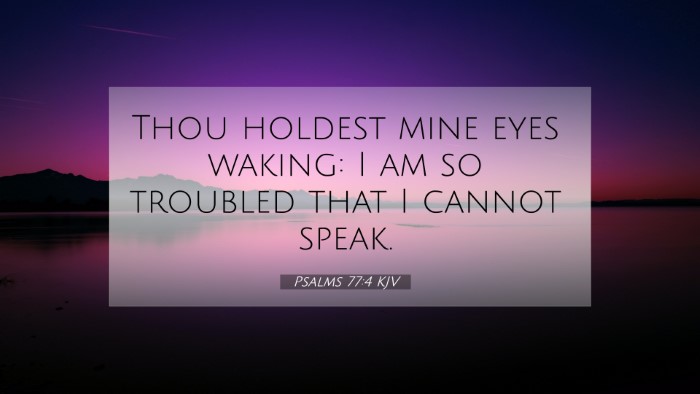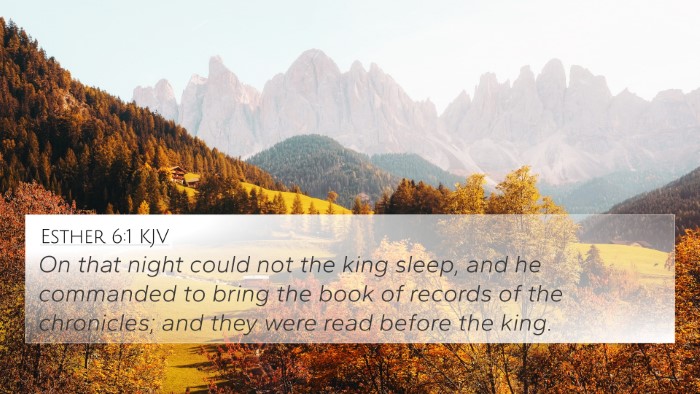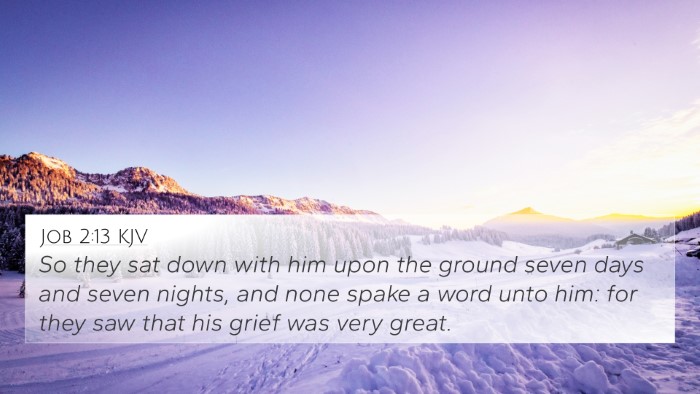Psalms 77:4 - Biblical Meaning and Interpretation
Bible Verse: Psalms 77:4
Verse Text: "Thou holdest mine eyes waking: I am so troubled that I cannot speak."
Summary of Insights
This verse from the Book of Psalms expresses a deep sense of distress and sleeplessness experienced by the psalmist. The inability to find rest leads to a profound spiritual and emotional struggle.
Key Themes
- Emotional Distress: The psalmist's sleeplessness reflects a state of turmoil, a theme prevalent in many psalms.
- Lack of Communication: The inability to speak indicates feelings of being overwhelmed and unheard.
- Divine Attention: The verse suggests an awareness of God's watchfulness, pushing the psalmist towards introspection and seeking understanding.
Commentary Insights
Various public domain commentators provide valuable perspectives on this verse:
Matthew Henry
Matthew Henry describes the psalmist’s state as one of extreme agitation, where the pressures of life hinder divine communication and personal peace. He remarks on the importance of recognizing God's omnipresence even in moments of deep distress.
Albert Barnes
Albert Barnes emphasizes the psychological aspect of the verse, noting that the inability to sleep signifies a mind burdened with troubles. He also points out that this experience is common among believers who wrestle with their faith amid suffering.
Adam Clarke
Adam Clarke elaborates that the phrase "holdest mine eyes waking" signifies profound anxiety. Clarke connects this verse to the restorative power of prayer and faith in God during such crises, suggesting that finding solace in Him is key.
Related Bible Cross-References
To further understand Psalms 77:4, consider the following cross-referenced verses:
- Psalms 6:6: "I am weary with my groaning; all the night make I my bed to swim; I water my couch with my tears."
- Psalms 42:3: "My tears have been my meat day and night; while they continually say unto me, Where is thy God?"
- Psalms 31:9: "Have mercy upon me, O Lord, for I am in trouble: mine eye is consumed with grief, yea, my soul and my belly."
- Psalms 119:147: "I prevented the dawning of the morning, and cried: I hoped in thy word."
- Matthew 26:40: "And he cometh unto the disciples, and findeth them asleep, and saith unto Peter, What, could ye not watch with me one hour?"
- Philippians 4:6-7: "Be anxious for nothing; but in every thing by prayer and supplication with thanksgiving let your requests be made known unto God."
- 1 Peter 5:7: "Casting all your care upon him; for he careth for you."
- Revelation 21:4: "And God shall wipe away all tears from their eyes; and there shall be no more death, neither sorrow, nor crying, neither shall there be any more pain..."
- Isaiah 26:3: "Thou wilt keep him in perfect peace, whose mind is stayed on thee: because he trusteth in thee."
- Hebrews 5:7: "Who in the days of his flesh, when he had offered up prayers and supplications with strong crying and tears unto him..."
Understanding Through Cross-Referencing
The theme of emotional burden found in Psalms 77:4 resonates throughout various parts of Scripture. The connections between Bible verses often highlight the common struggles faced by believers and God's constant presence through those afflictions. Cross-referencing these verses allows for a deeper understanding of the human experience shared within the Biblical narrative.
Exploring Inter-Biblical Dialogue
Through the exploration of connections between the Old and New Testaments, we can observe how the very burdens that trouble the psalmist echo throughout the teachings of Christ and the apostles. The patterns of distress followed by divine response exemplify the ongoing dialogue within the Scriptures regarding suffering and solace. This thematic exploration helps believers to connect personal experiences with Scriptural truths.
Conclusion
In conclusion, Psalms 77:4 serves as a poignant reminder of the struggles of life and the significance of turning towards God in times of trouble. By utilizing tools for Bible cross-referencing and engaging with related verses, one can gain a holistic view of the Scriptures' message of hope and divine companionship amidst distress.







